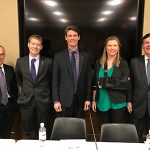On Feb. 13, the ACR co-sponsored Arthritis 101, its biennial arthritis advocacy lunch briefing at the U.S. Capitol, highlighting the disproportionate impact of rheumatic disease on active members of the armed forces and veterans. The event, co-sponsored by the Arthritis Foundation (AF), is part of the ACR’s effort to support inclusion of $20 million in dedicated funding for arthritis-focused medical research in the Department of Defense (DoD) Congressionally Directed Medical Research Program (CDMRP) budget.
Panelist Colin Edgerton, MD, FACP, RhMSUS
One of the event’s three panelists, Colin C. Edgerton, MD, FACP, RhMSUS, chair of the ACR Committee on Rheumatologic Care (CORC), says he wanted to help educate lawmakers about the impact of arthritis on service members and veterans, such as the men and women he treated as rheumatology service chief at Eisenhower Army Medical Center from 2006–2013.
“Arthritis is the No. 1 cause of disability among U.S. veterans and the second leading cause1 of medical discharge from the U.S. Army. As such, arthritis erodes the readiness of military units and cuts short promising careers,” says Dr. Edgerton, who is now in private practice in North Charleston, S.C.
“DoD-funded arthritis research has a positive track record in the U.S. military. The Fort Campbell [Ky.] disease-prevention laboratory successfully implemented an injury prevention program in a U.S. Army light infantry division with a high rate of deployments,” he continues. “With dedicated research dollars from the existing DoD CDMRP, longitudinally stable programs, such as these, could focus on supporting war-fighting units in preventing arthritis and improving readiness.”
Missed Opportunities
‘I was acutely aware of the missed opportunities. Their arthritis could have been prevented or the damage delayed.’ —Colin C. Edgerton, MD, CORC Chair
According to the U.S. Centers for Disease Control and Prevention (CDC), approximately one in three veterans has arthritis compared with one in four U.S. adults. As an Army rheumatologist, Dr. Edgerton was responsible for evaluating soldiers who were being medically discharged due to their arthritis symptoms, joint damage and disability.
“I was acutely aware of the missed opportunities. Their arthritis could have been prevented or the damage delayed,” says Dr. Edgerton, who also noticed high arthritis prevalence among retired veterans in his care, something he connected to elements of their military service. “While deployed to Iraq with an infantry unit, I recognized the enormous physical strains experienced by our nation’s heroes, and I felt that we owed them our best efforts in preventing and caring for their injuries.”
Moderator Steve Smith, AF Volunteer, Commander, U.S. Navy (Retired)
The event’s moderator, retired U.S. Navy Commander and AF volunteer advocate Steve Smith, stressed that both arthritis funding and awareness need to be higher to have a positive impact on the health of both active service members and veterans.
“Arthritis funding is rather limited from year to year at the DoD. It’s critical that policymakers know that arthritis is the No. 1 cause of disability2 among our military veterans and that research to identify joint injury management techniques and slow progression of the disease will benefit everyone,” said Cmdr. Smith. “The impact on the DoD and Veterans Administration budgets, as a consequence of this disease, will only grow over the coming decades.”
There is an urgent need for better arthritis treatment for active duty troops, said Cmdr. Smith. “They deserve the best care available to ensure they can fulfill their mission and retire on their own terms, rather than letting a disease like arthritis take them out of service.” Because arthritis is so prevalent throughout the population, more research funding will ultimately benefit everyone, he added.
Panelist Bill Goulet, AF Volunteer, U.S. Navy Veteran
Fellow panelist Bill Goulet, an AF volunteer advocate and a U.S. Navy veteran, says he participated to help inform lawmakers, as well as new recruits and active military service members, about how to manage arthritis, including proper nutrition, exercise, training, equipment and treatment.
“As prevalent as it is, arthritis is a fairly silent, debilitating disease,” says Mr. Goulet. “I believe it is important to give it a voice and draw attention to the far-reaching negative aspects of arthritis and the lives it affects, both those afflicted, and their caregivers and families.”
More arthritis research funding in the DoD budget could support the study of new treatments and preventive interventions to improve quality of life for people in and after military service, he says.
“This should significantly reduce the financial burden of arthritis treatment after joints are damaged and worn out,” he says. “Hopefully, the result will be a stronger military, and reduced post-military service healthcare and financial burden.”
Ongoing Advocacy
While one high-profile event may have a strong impact on members of Congress, Dr. Edgerton encourages ACR and ARP members to engage in ongoing advocacy with their local and state lawmakers.
“ACR and ARP members are respected as leaders in their fields. With a shrinking rheumatology workforce, society depends on the ever smaller number of rheumatology voices for guidance on issues such as regulatory policy and legislation,” says Dr. Edgerton.3“Advocacy at each level—local community, state and national—is important in tackling issues at the appropriate stop, such as state legislature versus the halls of Congress, and also builds support for rheumatology causes.”
Members can visit the ACR’s Legislative Action Center to quickly send a letter to their lawmakers asking them to support funding for a dedicated $20 million DoD arthritis research program.
Susan Bernstein is a freelance journalist based in Atlanta.
References
- Allen KD. Musculoskeletal health: Addressing the leading causes of disability. NC Med J. 2017 Sep–Oct;78(5):306–309.
- Rivera, JC, Wenke, JC, Buckwalter, JA, et al. (2012). Post-traumatic OA caused by battlefield injuries: The primary cause of disability in warriors. J Am Acad Orthop Surg.2012;20 Suppl 1:S64–S69.
- American College of Rheumatology. 2015 workforce study of rheumatology specialists in the United States. https://www.rheumatology.org/portals/0/files/ACR-Workforce-Study-2015.pdf.

